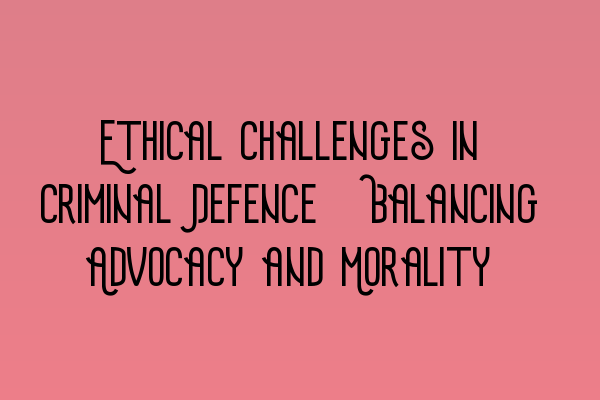Ethical Challenges in Criminal Defence: Balancing Advocacy and Morality
As a criminal defence solicitor, one often finds themselves facing ethical challenges in their daily practice. The role of a defence lawyer is to provide zealous advocacy for their clients, ensuring that their rights are protected and the principle of justice is upheld. However, this advocacy can sometimes conflict with a lawyer’s personal moral compass.
The Duty of Advocacy
Defence lawyers have a duty to advocate for their clients, regardless of their personal beliefs or opinions. This duty requires them to provide an effective defence, challenge the prosecution’s evidence, and ensure a fair trial. It is essential for criminal defence solicitors to approach each case with professionalism and objectivity.
However, the concept of “zealous advocacy” can often raise ethical dilemmas. Lawyers may be required to defend clients they believe to be guilty or engage in tactics that are ethically questionable. This tension between advocacy and morality can be challenging to navigate.
Moral Dilemmas in Criminal Defence
One of the most common ethical challenges faced by criminal defence solicitors is the representation of clients who they believe to be guilty. While everyone is entitled to a fair trial and legal representation, defending individuals who have committed heinous crimes can be emotionally taxing.
Defence lawyers must confront their own moral judgments and biases, striving to maintain their professionalism and provide a robust defence for their clients. It is an integral part of the criminal justice system to ensure that all defendants are given a fair chance, regardless of their guilt or innocence.
Striking a Balance
Striking a balance between advocacy and morality is crucial for criminal defence solicitors. It requires a deep understanding of the law, empathy, and the ability to separate personal beliefs from the obligation to provide an effective defence. By adopting a professional approach and respecting the principles of justice, solicitors can overcome ethical challenges while upholding the dignity of their profession.
In today’s legal landscape, where the SQE (Solicitors Qualifying Examination) is set to reform the solicitor qualification process, aspiring solicitors must also be equipped with a solid foundation in ethics and professional responsibility. The SQE’s criminal law and practice assessments will test not only candidates’ knowledge of the law but also their ethical decision-making skills. SQE 1 Practice Exam Questions and SQE 1 Practice Mocks FLK1 FLK2 offer comprehensive preparation resources for aspiring solicitors.
Continuing Professional Development
It is essential for criminal defence solicitors to engage in continuing professional development (CPD) to stay updated on the latest legal developments and ethical considerations. SQE 2 Preparation Courses provide valuable opportunities for solicitors to refine their skills in criminal law and practice.
By participating in SQE 1 Preparation Courses, solicitors can also ensure they are well-prepared for the SQE’s rigorous examination process. Staying informed about SRA SQE Exam Dates is crucial to plan and strategize exam preparation effectively.
Ultimately, ethical challenges in criminal defence are a delicate balance between advocating for clients and upholding personal morals. By continuously striving for excellence in legal representation and investing in professional development, criminal defence solicitors can navigate these challenges effectively while maintaining the integrity of the legal profession.
